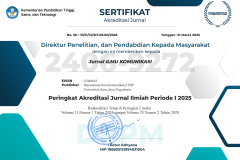Potret Pendidikan Indonesia dalam Puisi â€Sajak Anak Muda†Karya WS Rendra
DOI:
https://doi.org/10.24002/jik.v8i2.176Abstract
Abstract: Education is a sub-system that interrelates with other essential sub-systems. In the New Order era, the government policy on education had given rise myths that stimulate youth to prefer things pragmatically and instantly. Education, then, is no longer experienced and perceived as humanizing process. Poetry is one of transmitting message channel using many symbols that contain portraits of such situation. Using semiotic approach, this essay explains the myths and ideologies on education in Indonesia using one of WS Rendra’s poem: “Sajak Anak Mudaâ€.
Abstrak: Pendidikan merupakan sub-sistem yang interelatif dengan sub-sub sistem lain. Pada jaman Orde Baru implementasi kebijakan pendidikan telah melahirkan mitos hingga melahirkan anak didik yang lebih suka pada hal-hal pragmatis dan instan. Pendidikan tidak lagi dihayati sebagai proses yang memanusiakan. Puisi adalah satu media penyampaian pesan dengan banyak perlambang, yang di dalamnya dapat ditemukan suatu potret situasi. Menggunakan pendekatan semiotik, tulisan ini mencoba membongkar mitos dan ideologi tentang pendidikan di Indonesia melalui puisi karya Rendra berjudul â€Sajak Anak Mudaâ€.
Â
Downloads
Published
How to Cite
Issue
Section
License
Jurnal ILMU KOMUNIKASI is an academic journal. As such, it is dedicated to the open exchange of information. For this reason, JIK is freely available to individuals and institutions. Authors who publish in Jurnal ILMU KOMUNIKASI will release their articles under the Creative Commons Attribution (BY) License. This license allows anyone to copy and redistribute the article in any medium or format as well as remix, transform, and build upon the material for any purpose, even commercially as long as they credit the authors for the original creation. For details of the rights authors grants users of their work, see the "human-readable summary" of the license, with a link to the full license. (Note that "you" refers to a user, not an author, in the summary)
 This work is licensed under a Creative Commons Attribution 4.0 International License.
This work is licensed under a Creative Commons Attribution 4.0 International License.














